|
1.
CENTRAL/ WEST AFRICA
Prices hold steady despite sluggish markets
There were no price changes reported from early to mid-
May given the subdued trading environment. As noted
previously, there were some hints of a mild resumption of
European buyer interest, especially from the UK, where
some importers and merchants were of the opinion that incountry
stocks of the major species were so low as to
require top-up purchases within the month. Other analysts
pointed to drastically lower production in West and
Central African exporting countries and believed there
could be problems in sourcing prompt supplies of favorite
species such as sipo and even sapele.
Thus far, none of this speculation has resulted in any
impact on the rate of new inquiries. Exporters report very
little interest from European traders. French importers
were said to be particularly well-stocked and unlikely to
resume serious buying ahead of the annual European
summer holiday period commencing end June. West and
Central African producers were concentrating on Asian
and Indian markets where business appeared to be holding
steady. Small volumes of sawn lumber were shipped to the
Netherlands, where construction activity was slightly
improved, and to Italy, where the furniture manufacturing
and export trade was maintaining its export market share
in a difficult economic climate.
At present, it is difficult to predict how the market will
develop through the end of the quarter. Possibly, there will
be no changes in the current stable prices but low volume
conditions could be expected to be a ¡®best guess¡¯ for the
time being. Governments have promised action and have
injected taxpayers¡¯ money into the governments¡¯ financial
markets. It is expected that the results of these moves will
begin to impact the market and business in the near future.
EC concludes VPA with Republic of Congo
The European Commission (EC) has announced the
successful conclusion of a Voluntary Partnership
Agreement (VPA) with the Republic of Congo to tackle
the problem of illegal logging and illegal trade. The
system established under the Agreement will ensure
timber products exported to the EU from the Congo will
be from legal sources. The first legal exports to Europe
under the new system are expected in 2011. By that time, a
system of legal verification and traceability will be in
place, requiring the timber products to be supported by
licences showing the products have been legally harvested
and are from sustainably managed forest sources.
The deal, which was struck after 14 meetings and 4
negotiating sessions, provides for the two parties to agree
on, inter alia, the definition of legality, a legal system of
verification, a system of traceability and an independent
audit system. According to a press release from the EC,
the Agreement also allows for a high level of engagement
of civil society groups in shaping laws on forest
governance and industrial logging monitoring approaches
in the country. The agreement is the first of its kind in
Central Africa and Congo is the second country in the
world, after Ghana, to conclude such an agreement.
According to a press release by the European Forest
Institute, the Agreement will reassure European consumers
of the origin of timber imported from Congo. Mr. Henri
Djombo, Minister of Forest Economy, noted a total of
4,674,320 acres of certified forests were in the Congo as
of March 2009 and hoped the new Agreement would boost
new opportunities for Congo in European timber markets
and reinforce governance in the sector. Currently, Congo
exports some USD330 million of timber and timber
products, of which half are sent to European countries
such as Italy, Spain, Portugal, France, Germany, the
Netherlands and Belgium.
Gabonese timber company records significant increase in turnover
The National Timber Company of Gabon (SNBG)
reported record turnover of 12% in 2008, reported Afrique
en Ligne. The jump from 7% in 2007 occurred due to the
massive rise in sales volumes, with China and India
absorbing 84% of sales when compared to 66% in 2007.
The volume of various timber species grew nearly fourfold
in 2008, rising 3,300 m³ in 2007 to 12,307 m³ in
2008. Mahogany was the most popular species sold,
representing 74% of total sales in 2008.
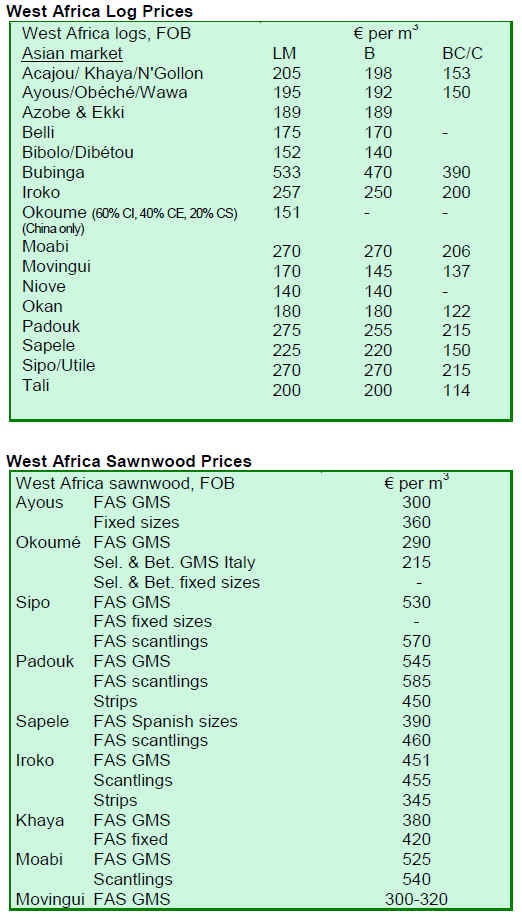
2. GHANA
Scanstyle harness saw dust to generate electricity
Scanstyle Biofuel of Denmark and Scanstyle Ghana Ltd, a
timber processing firm in Ghana, are using saw dust to
form wood pellets designed to generate heat for electricity.
The electricity from the boilers can be used for lighting
purposes, including in urban households, thereby reducing
the pressure on the national electricity grid. The
information was conveyed by Mr. Albert Zanu, Deputy
Managing Director of Scanstyle Mim Ltd., during an
exhibition of wood products by Scanstyle in the nation¡¯s
capital, Accra. Prior to the collaboration between the two
firms, saw-dust from the company¡¯s mills were discarded
as by-products of little or no economic value. Mr. Zanu
explained the value of sawdust has now increased since it
is being used as pellets to generate heat in boilers. It has
become an important by-product for the generation of
electricity in the country.
A director of Scanstyle Mim, Mr. Paul Kwabena Pepra,
said the company had planted its concession with a variety
of timber species as part of its contribution to afforestation
in the country. He said some of the species available in the
concessions included dahoma, danta, iroko (odum),
candollei, redwood and wawa. He added that a recent
survey conducted on Ghana¡¯s markets revealed there was
great potential in the domestic market that had been
neglected for a long time.
Mr. Pepra said Scanstyle intended to change its over
reliance on the export market and concentrate more on the
domestic market. He also said the company had made a
firm commitment to treat its domestic customers with due
respect and regard by providing them with the right
products at the right time and price. He explained the
global economic downturn had provided exporters with a
lesson of not being overly reliant on foreign trade at the
expense of domestic trade. Mr. Pepra said the company
was building a warehouse in Accra to enable its customers
to purchase kiln-dried wood products at ex-stock prices.
Scanstyle Ghana Ltd. has been the nation¡¯s leading
exporter of furniture parts to Europe for the past four
decades.
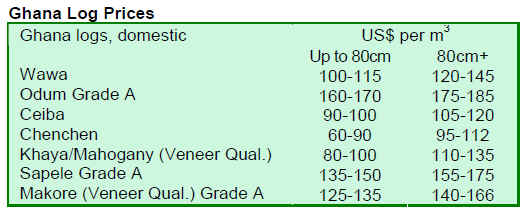
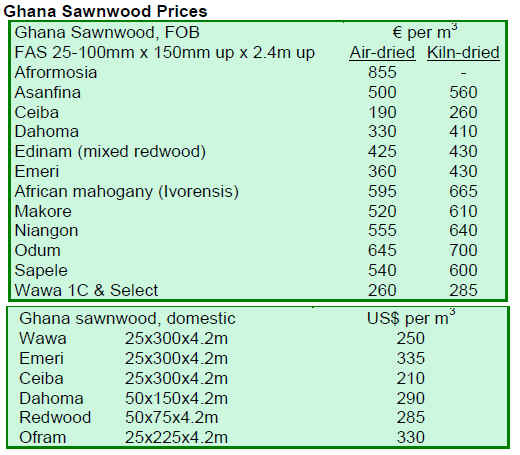
3.
MALAYSIA
EC and Malaysia in final stages of VPA negotiations
The EC and Malaysia are entering into the final stages of a
bilateral Voluntary Partnership Agreement (VPA) in the
trade of legally produced and harvested timber, reported
Bernama. Senior trade negotiators will meet in June or
July 2009 to resolve outstanding issues once the technical
aspects of the Agreement are approved by both sides.
According to Vincent Piket, Ambassador and Head of
Delegation of the European Commission in Malaysia,
legal mechanisms were being finalized in the EU to stop
the problem of trade in illegally harvested timber and thus
it was vital the VPA be agreed upon soon. Malaysia
exports up to RM2.8 billion (EUR600 million) worth of
timber products to the EU every year.
PEFC endorses MTCS
On 5 May, the Programme for the Endorsement of
Certification (PEFC) announced that the Malaysian
Timber Certification Scheme (MTCS) had become the
first tropical timber certification scheme in the Asia-
Pacific region to be endorsed by the Programme. The
MTCS, which is operated by the Malaysian Timber
Certification Council (MTCC), is also the only tropical
scheme to be endorsed by the PEFC after the Gabonese
Forest Certification Scheme, reported The Daily Express.
The Chairman of the MTCC, Dato Dr. Freezailah Che
Yeom, said the endorsement allows the MTCS to gain
mutual recognition with 26 other PEFC-related
certification schemes. It also allows MTCS-certified
manufacturers and exporters to combine PEFC-certified
material from Malaysia with other PEFC-certified material
under the PEFC logo.
MTC sees potential in Middle East amid global exports decline
The Malaysian Timber Council (MTC) continues to
believe the Middle East holds much potential for
Malaysian timber products in spite of the current global
economic slowdown affecting its traditional markets,
reported Bernama. Malaysia exported RM1.7 billion
worth of timber products to the Middle East in 2008, in
which the UAE accounted for RM850 million.
The Star indicated Malaysian exports of all products
continued to fall in March, declining for the sixth month in
a row to RM43.6 billion, a 15.6% drop from the same
period 2008. Exports contracted 20% to RM121.47 billion
and imports declined 28.9% to RM88.8 billion in the first
quarter of 2009. Total trade amounted to RM210.27
billion, marking an overall decline of 24%.
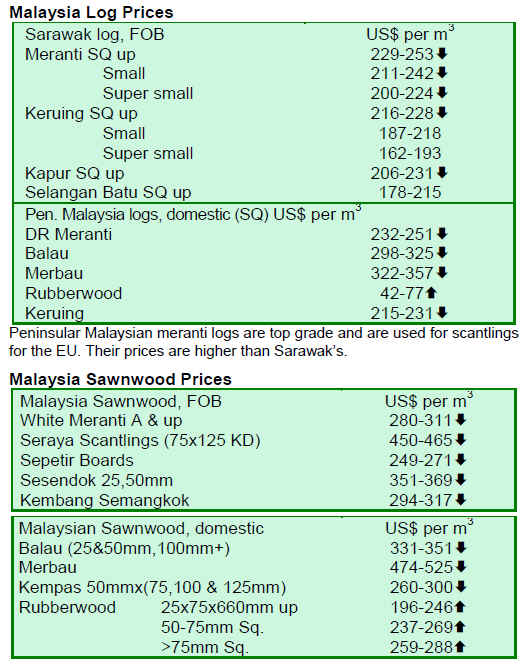
4.
INDONESIA
India mulls slapping 30% duty on Indonesian particleboard
Indonesian particleboard exports to India, together with
those from other countries, may be subject to a safeguard
duty of up to 30%, noted Business Standard. The
Directorate General of Safeguards (DGS) of India has
recommended imposing this duty, which is a form of
emergency import duty, for a period of up to 200 days as a
measure to protect Indian particleboard manufacturers.
A surge in imports from other low-cost producers had led
a number of major Indian manufacturers, which account
for 60% of domestic production, to file a petition with the
Indian government. While the petition requests extending
this protection to Indian manufacturers for a period of up
to four years, no decision has been made to date.
Indonesian manufacturing sector contracts in first quarter 2009
The Jakarta Post reported on the contraction of the
Indonesian manufacturing sector in first quarter 2009, with
output easing marginally by 1.6% vis-¨¤-vis fourth quarter
of 2008, according to the Central Statistics Agency (BPS)
of Indonesia. The timber and non-furniture timber sectors
declined 5.1%. Imports of industrial raw materials plunged
42.2% in the first quarter of 2009.
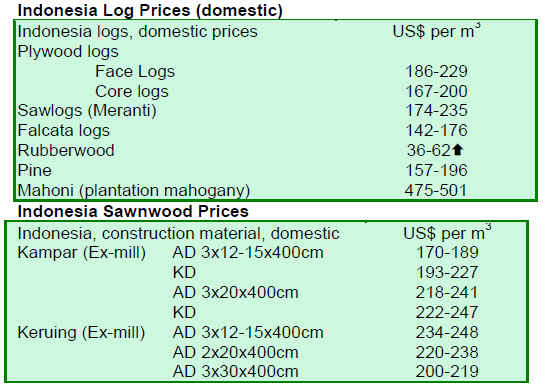
5.
MYANMAR
Decline in prices may indicate slump in demand
Despite efforts to maintain previous prices by shifting the
amount of supply available, price declines in the April
tender indicated a slump in demand. Analysts say the
actual situation of price and supply in the markets will be
clearer in the next few months. No new contracts on an exworks
basis have been entered into, except for the
replacement of outstanding contracts on an FOB basis
with an ex-works basis. The next tender sales will be on
22 and 25 May.
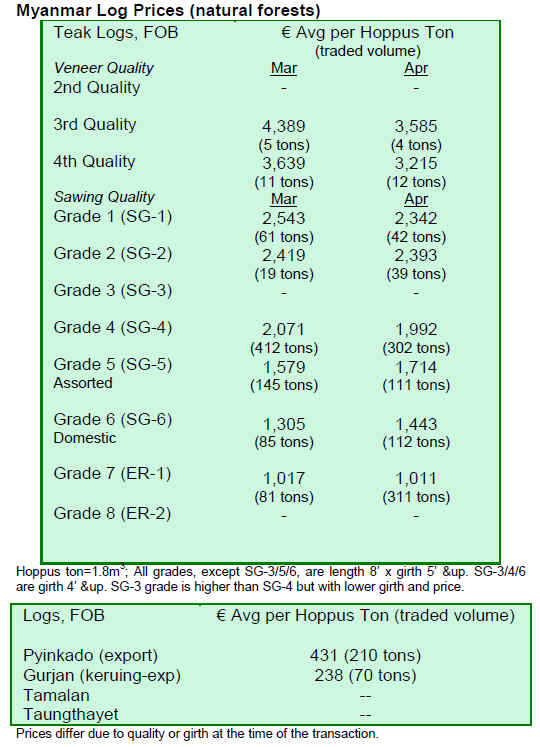
6. BRAZIL
Brazilian institute develops new technique in timber
tracking
The Web Forest Planet Institute has developed a
technology to mark trees with electronic chips containing
information on species, height and size, reported Globo
Amazônia. A new system enables the chips to be placed on
tree trunks to control forest management areas and combat
deforestation. The technique was designed for use in forest
management areas where timber extraction has been
planned. Using the new technique, it will be possible to
control trees being logged through a central monitoring
center. After logging, timber can be monitored from
harvesting through to processing. The objective is to stop
timber fraud in the field and report false volume
registration.
The current logging process may be undermined by fraud.
Cases are common in which the timber volume logged in a
forest management area is increased on paper so that
illegal timber logged in other locations, such as federal
lands, can be included in the total allowable harvest of the
forest management area and be passed as legal. The new
control system is said to be capable of identifying each
tree being logged, so that the whole process will be
electronically tracked, eliminating this type of fraud.
However, the initiative requires timber industries to
provide for and utilize the technology.
Par¨¢ timber industry closes first quarter with more lay offs
The state of Par¨¢ timber industry closed the first quarter of
2009 with a net loss of 1,596 jobs, reported O Liberal.
According to a study by the Department of Statistics and
Socio-economic Studies of Par¨¢ (DIEESE-PA), the
informal sector of the timber industry in Par¨¢ employed
2,127 new people but laid off 3,723 employees during the
period between January and March 2009.
The study, based on information from the General Register
of Employed and Unemployed (CAGED) of the Ministry
of Labor, analyzed several timber employers, including
sawmills, veneer manufacturers, wood packagers, among
others. The results indicated the forest segment losing the
most jobs was the solidwood/sawmilling segment, which
suffered a significant loss of 924 jobs, followed by veneer
manufacturing, which lost more than 505 jobs.
On the other hand, the Brazilian Association of Furniture
Companies (ABIMOVEL) expects a 5% growth in the
domestic market this year. For the foreign market,
ABIMOVEL believes revenue will be 3% higher than last
year. Exports account for 10% of the total production in
Brazil.
Norway reaffirms commitment to Amazon Fund
The Norwegian ambassador in Brazil confirmed Norway¡¯s
strong commitment to supporting projects in the Amazon
to help keep the forests and preserve the way of life of
traditional local populations during this recent visit to Par¨¢
state. According to news reports in Ag¨ºncia Brasil, the
ambassador said the government and public and private
institutions of the state could begin preparing their project
proposals to gain access to the Amazon Fund being
facilitated by the National Bank of Economic and Social
Development (BNDES).
The governor of Par¨¢ state presented a few environmental
programmes developed by the state government of Par¨¢
such as the forest restoration programme with commercial
value species developed under the ¡®1 Billion Trees for the
Amazon¡¯ Programme, which involves training,
technology, land title regularization and bank credit lines
for small farmers. The governor also emphasized the
importance of encouraging payment for environmental
services.
Norway was the first country to contribute financial
resources to the Amazon Fund. On 25 March 2009, the
contract was signed with BNDES and funds worth
USD125 million had been transferred to the bank. The
total financial commitment to the Fund was expected to be
USD500 million, but Norway indicated that its
contribution could be upward of that amount.
Brazilian furniture exports tumble more than 29%
Brazilian furniture exports plunged 29.3% from January to
March 2009, compared to the same period of 2008. The
state of Rio Grande do Sul, however, remained stable,
showing an increase of 1.9% in exports.
The countries with the highest amount of increased
furniture imports by volume were: Argentina (23%);
Uruguay (15%); and Angola (153.4%). Other large
furniture importing countries from Rio Grande do Sul
were the UK, Chile, Spain, the United Arab Emirates and
the US, which reduced their imports by 20.8%, 53.3%,
74%, 85% and 22.7%, respectively. Argentina is the
largest importer of the Rio Grande do Sul¡¯s furniture
exports, followed by the UK, Angola, Uruguay and the
US.
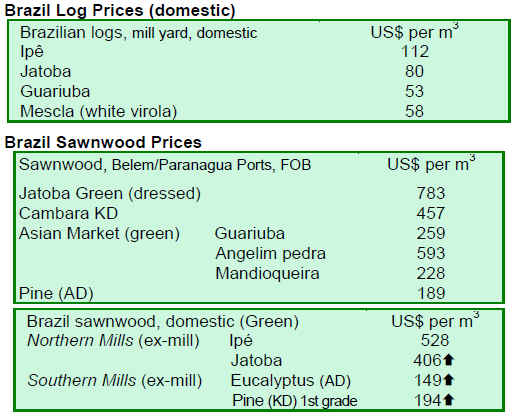
7.
PERU
Peruvian army gets involved with indigenous dispute
According to the BBC, Peru¡¯s armed forces will support
local police forces for up to 30 days to ensure road,
airports and other services remain open during clashes
with indigenous protesters. Over 65 indigenous groups
have been protesting the government¡¯s handing over
indigenous territories to multinational companies without
adequate consultation with the groups. The indigenous
groups seek greater involvement in the development
process of the territories being released to the companies
for extractive industrial use.
Peru could compensate Indian communities for protecting the Amazon
Peru¡¯s Ministry of Environment has been developing a
system of compensation to Indian communities that would
help protect the forests of the Peruvian Amazon. The state
would pay S/5.00 (USD1.70) for every hectare of
preserved forest. The Minister of Environment, Antonio
Brack, noted the programme would enable the
communities to receive about S/55 million (USD18.3
million) from the year 2010.
Peru has 11 million hectares of forests that have been
allocated to various native villages. The funds are also
expected to help achieve other development objectives on
health and education. Brack also said the program might
be financed with the resources of the state and grants for
international cooperation. Brack confirmed the resources
needed for the initiative would be included in the public
budget for fiscal year 2010. He noted native communities
in Peru currently receive USD30,000 in total from
international cooperation funding to preserve their forests.
Peru signs FTA with China
After a year of negotiations, Peru and China signed a Free
Trade Agreement (FTA) to grow the Peruvian export
market to the Asian giant, as well as stimulate further
Chinese investment in Peru. According to the Vice
Minister of Foreign Trade, Eduardo Ferreyros, the
agreement will allow Peru to export USD805 million in
various non-traditional products. China is expected to
increase its investments to Peru up to USD4.5 million.
Ferreyros also noted that total exports to China have
significantly expanded during the last few years, growing
149% between 2004 and 2007.
Bozovich Wood sees year of minor growth
Bozovich Wood, a company dedicated to the utilization
and marketing of wood, announced its forecasts for 2009
and expected minor growth in exports for the remainder of
the year. Between January and March 2009, the company
generated 39% less in revenues than the same period in
2008. Due to the company¡¯s losses, it has had to reduce its
workforce by 20%.
Although 80% of its products have been exported to
traditional market destinations, the company will revamp
its strategy to offset losses and move more products to the
internal market. Their goal is to redirect to the internal
market more than 10% of a variety of its flooring products
(laminated and parquet), which will be exhibited in home
improvement shops.
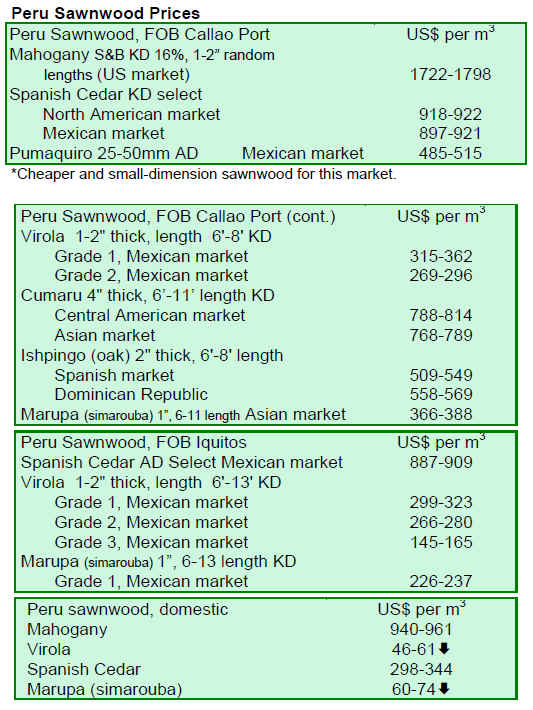
8. BOLIVIA

9. Mexico
World Bank studies threats of climate change to
Mexico
La Jornada reported on the results of a World Bank study
explaining the effects of climate change in the Latin
America and Caribbean regions. In the specific case of
Mexico, the study noted that climate change would
threaten the production of about 85% of agricultural
operations in the country.
One of the three authors of the study, Mr. Pablo
Fajnzylber, noted climate change would represent a wider
threat to the country¡¯s development. He explained that the
Latin American and Caribbean regions would need to
undertake actions to mitigate the effects of climate change
through energy efficiency; the reduction of deforestation;
improvements in public transport; generation of renewable
energy; development of low cost biofuels; and improving
the handling of sold residues.
10.
Guyana
Prices show continued resilience over previous
fortnight
Log prices have surged for the period 16-31 April 2009
against the corresponding fortnight for 2008, with changes
evident in prices for purpleheart logs. (235/170 USD).
Sawnwood prices have also soared compared to the same
period of 2008, while plywood prices have remained fairly
stable. A quarterly comparative export price analysis is
summarized below for Guyana¡¯s main forest products:
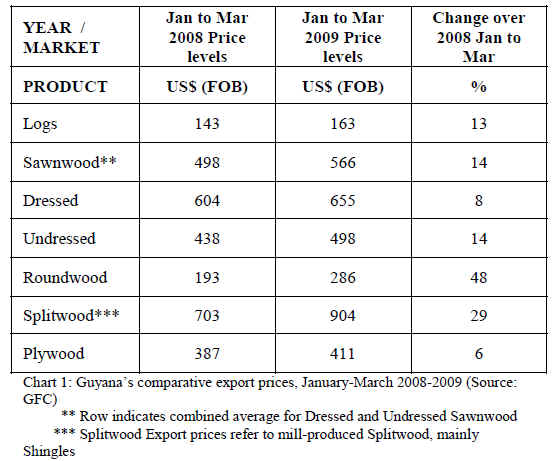
Export of shingles, windows and builders joinery products
jumped by over 21% in value, with the largest revenue
generated from sawnwood followed by plywood. There
has been a notable increase in production over the first
quarter 2009 compared to 2008, particularly for splitwood
(shingles) and logs.
Guyana¡¯s newly implemented log export policy has
successfully helped lower the volume of logs exported in
the first quarter of 2009. Quarterly analysis shows that
prices have firmed for all products over a range of 6% to
48%, with significant price rises seen in roundwood (for
which the US is the largest market); shingles (splitwood);
and lumber prices (for which the largest market is the
Caribbean market).
Guyana gains from saw doctoring training
A training project executed by the Guyana Forest
Commission on saw doctoring techniques came to a close
on 4 May 2009 at a ceremony hosted by the Ministry of
Agriculture in Guyana. This project was executed under
the Canadian Cooperation Fund of the Public Works and
Government Services, Canada (PWGSC) and specifically
addresses various aspects of training in saw doctoring in
Guyana.
This project sought to provide training to persons engaged
in saw doctoring in the wood processing sector, which
involves maintaining saws and relevant tools in
sawmilling operations to ensure maximum production and
efficiency. The initiative trained 60 stakeholders in the
sector to improve efficiency, productivity and quality of
end products. With the successful completion of this
project, it was expected that milling efficiency and
competency would improve the quality of lumber.
The Minister of Agriculture, in the closing ceremony,
expressed the Government¡¯s recognition of the important
role which the forest sector played in small and medium
size industries. Minister Persaud emphasized that forest
products must be optimally utilized to recognize the full
potential of the sector. He noted that despite the size of
operations, efficiency is an outcome that must be pursued,
since forest resources and natural tropical forest products
are experiences higher demand and scarce supply in many
regions.
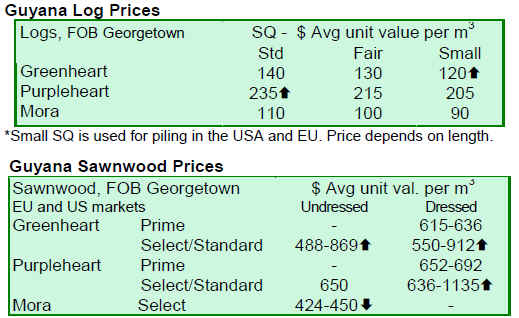
|